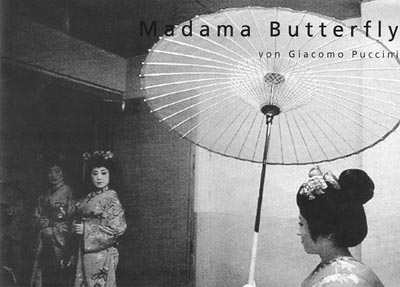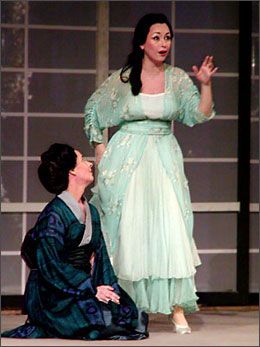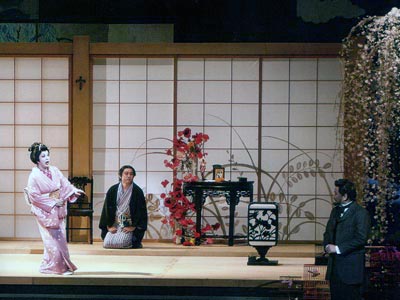- Culture top
- Cultural tradition
- Japaneseness
- Japanese personal names
- Shinto shrine
- Music
- Furtwängler′s Piano concerto
- 125th birthday of Furtwängler
- Say NO to Mme Butterfly!
- Threepenny Opera in Tokyo
- European chamber music
- Morita Doji - singer song-writer
- Popular songs (19c-45)
- Popular songs (45-70)
- Popular songs (70-90)
- Popular songs (90-21c)
- Art
- ShimoumArt
- Gansen Urushi Studio
- Exhibition of K. Machida
- Glass baby by K. Matsufuji
- "Kawaii kyara" by K.Tanoue
- Performing art
- Takarazuka & Mizu Natsuki
- Sajikidōji - a theater guide
- Sajikidōji - April in Sumida
- Gesshoku-Kageki-Dan
- Variety show with clowns
- Sports
- Sumo is in a turbulent period
- Atamifuji - re-debut in Makuuchi
- Atamifuji - a spectacular debut
- Hakuho leaves Sumo Org
- Hakuho and his retirement
- Terunofuji - miracle come back
- Oozumo Akibasho
- Dinner at Isegahama-beya
- Miscellaneous
- Planetarium in Shibuya
- Shin-hyoron and booksales
Say NO to Madame Butterfly!
| In Frankfurt am Main, Chochosan wore a lace negligee and lether boots. Well-built for a 15 years' old Japanese girl! |  |

In Kassel the program was decorated with images of geisha.

In Mannheim Chochosan wore Western cloths because she insisted to be Mrs. Pinkerton.

Chochosan in the image of average Japanese people was found in Tokyo.
It is true that many similar cases happened when Japan as a poor developing country opened its country to the Western colonial powers in the mid-19th century. Diplomats, merchants and soldiers came to Japan and bought tentative sex partners. Similar things would happen always and everywhere when men from rich and powerful countries and women from poor and weak countries encounter. Despite the popularity of Madame Butterfly, this type of human relations is certainly against the basic human rights and I wonder why such a piece continues to be performed and positively accepted by the audience in civilized societies.
I also cannot understand the mentality of the Japanese people, who not only appreciate Madame Butterfly but also recommend it as a good title to introduce Japan and its culture to foreigners. Maybe because Madame Butterfly is the only opera where a Japanese soprano singer can play the title role on internationally renowned stages! However, I believe that this is the very source of the misunderstanding among Westerners about Japanese women, tradition and society.
Several years ago I attended a seminar held in a German protestant monastery to discuss on Madame Butterfly. Before going to the seminar, I sorted out all Butterfly performances held around Frankfurt where I lived and watched them with much interest. While their dramaturgy varied from the most avant-garde Frankfurt to rather conservative Kassel and Mannheim, all performances looked strange from the Japanese eyes, because behaviors of casts on the stage together with their cloths were very alien to us. Many Japanese people will certainly feel offended, if their culture is presented with such distortions.
The Nikikai(*) performance of Madame Butterfly in Tokyo Bunka Kaikan on 9 October was perfect in this regard. Kuriyama Masayoshi directed the stage in line with the traditional aesthetics and all casts did not have any difficulty in wearing kimono and behaving very beautifully and naturally, because they were all natives.
- (*)
- A leading organization of opera performers in Japan.
However, I cannot accept this very point, the cause of Chochosan's tragedy. She was not a usual bride, but a local wife sold to a foreigner for his pleasure and not much different from prostitute. This understanding is perfectly endorsed when you carefully watch the words of Pinkerton and the price of Chochosan explained by Goro. In this sense, I rather agree to the hyper-modern interpretation of the Frankfurt opera. But, that is also not the story which a patriotic Japanese person is pleased to hear.
It is nonsense to underline the tragedy of an unfulfilled love of Chochosan, because such cases of local bride were well known at the time and if girls did not pay much attention to their reputation among fellow Japanese, a tentative marriage with a foreigner was not a bad business. Therefore, Chochsan could easily foresee her future and easily compromise with it, if she had an average sense of understanding. Those girls were called rashamen(*) and looked down on by ordinary people. But, they could have in most cases better business than ordinary prostitutes, because their clients were much richer, and according to the Japanese source no rashamen committed suicide. On the contrary many of them married to other men after their tentative partners had departed from Japan.
- (*)
- This special term "rashamen" came from a Portuguese word. "Rasha" comes from "raxa" for woolen cloths and "men" means sheep. The combined word originally meant sheep and then was transformed to mean local wives, because there was a popular view among Japanese people that Western sailors keep sheep in their ships so as to satisfy their sexual desire.
It is absurd to treat a prostitute as the ideal of Japanese women. This is nothing other than a slander against Japan. Only those Japanese people, in particular women, who blindly follow the West miss the point and enable this traitorous piece be continuously performed everywhere in the world. It is also ridiculous that geisha is thought to represent Japanese women and books on geisha still become bestsellers in many Western countries, where the meaning of geisha is perverted and geisha's role as uncomplicated sensual friend is emphasized.
Madame Butterfly frustrates me. I would state at the end of my short essay "Say NO to Madame Butterfly!"